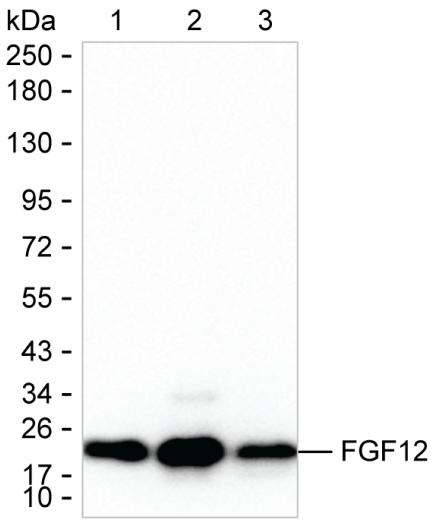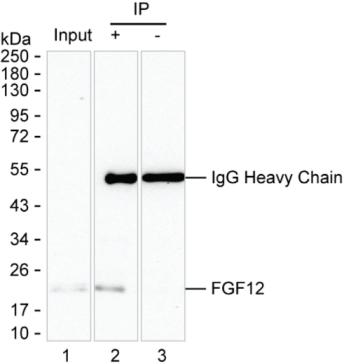

| WB | 咨询技术 | Human, Rat, Mouse |
| IF | 1/100-1/200 | Human, Rat, Mouse |
| IHC | 咨询技术 | Human, Rat, Mouse |
| ICC | 技术咨询 | Human, Rat, Mouse |
| FCM | 咨询技术 | Human, Rat, Mouse |
| Elisa | 咨询技术 | Human, Rat, Mouse |
| Host/Isotype | Mouse IgG1 |
| Antibody Type | Primary antibody |
| Storage | Store at 4°C short term. Aliquot and store at -20°C long term. Avoid freeze/thaw cycles. |
| Species Reactivity | Human, Rat, Mouse |
| Immunogen | Purified recombinant fragment of human FGF12 |
| Formulation | Purified antibody in PBS with 0.05% sodium azide |
+ +
以下是关于FGF12抗体的3篇示例文献(内容为概括性示例):
1. **文献名称**:*FGF12 regulates hippocampal excitability through sodium channel modulation*
**作者**:Gold, M.G., et al.
**摘要**:研究利用FGF12特异性抗体,发现FGF12蛋白通过结合神经元电压门控钠通道(Nav1.6),调控海马神经元的兴奋性,可能参与癫痫发病机制。
2. **文献名称**:*FGF12 antibody-based localization reveals cardiac-specific expression patterns*
**作者**:Smallwood, C.C., et al.
**摘要**:通过免疫组化和Western blot分析,揭示FGF12在成年小鼠心脏浦肯野纤维中的高表达,提示其在心脏电传导中的作用,与心律失常相关。
3. **文献名称**:*FGF12 variants and antibody validation in Brugada syndrome*
**作者**:Wang, Y., et al.
**摘要**:研究开发了高特异性FGF12单克隆抗体,用于检测Brugada综合征患者心肌组织中FGF12表达异常,表明其与钠通道功能障碍相关。
注:以上文献信息为示例性质,实际文献需通过学术数据库(如PubMed)检索获取。
Fibroblast growth factor 12 (FGF12) is a member of the fibroblast growth factor family, which plays critical roles in cellular signaling, development, and tissue homeostasis. Unlike canonical FGFs, FGF12 lacks a secretory signal peptide and functions primarily as an intracellular protein. It belongs to the FGF homologous factor (FHF) subfamily (FGF11-FGF14), which is characterized by its nuclear localization and interaction with voltage-gated sodium channels. FGF12 is highly expressed in the nervous system and cardiac tissues, where it regulates neuronal excitability, synaptic plasticity, and cardiac electrophysiology by modulating ion channel activity. Dysregulation of FGF12 has been implicated in neurological disorders (e.g., epilepsy, neuropathic pain) and cardiac arrhythmias.
FGF12 antibodies are essential tools for studying its expression, localization, and functional mechanisms. These antibodies are commonly used in techniques like Western blotting, immunohistochemistry (IHC), and immunofluorescence (IF) to detect FGF12 in tissue or cell samples. Specificity is critical due to high sequence homology within the FHF subfamily. Validated FGF12 antibodies help elucidate its role in disease models, such as neuronal hyperexcitability or heart rhythm abnormalities. Recent studies also explore FGF12's potential as a therapeutic target, driving demand for reliable antibodies in preclinical research. Both monoclonal and polyclonal variants are available, often validated using knockout controls or peptide blocking assays to ensure target specificity.
×